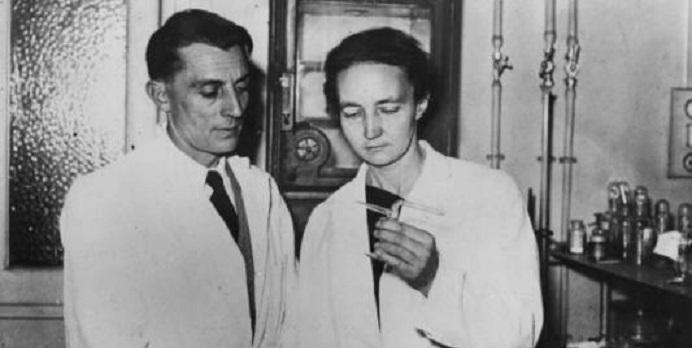French physicists Joliot Curie and Iren Joliot Curie were the son-in-law and eldest daughter of the famous scientist Marie Curie. They were awarded the 1935 Nobel Prize in Chemistry for the discovery of artificially radioactive substances. But before that, they lost a chance to win the title.
In 1920, the famous British atomic physicist Rutherford predicted that there might be a neutral particle with a mass similar to that of a proton in an atom. He has lectured in France on this subject.
At that time, Joliot Curie and his wife thought that it was just a popular science lecture, so they did not listen. In 1928, the German physicists Botte and Baker experimented to obtain a highly penetrating radiation. They thought that this mysterious ray was an electromagnetic wave, so they did not investigate deeply.

Mr. and Mrs. Jolio Curie
The Joliots continued the work of Bott et al., and in 1932, they bombarded beryllium, lithium, boron and other elements with α rays produced by radioactive polonium, and also found penetrating radiation. They went on to show that this ray is not an electromagnetic wave.
But they were puzzled by what the conclusion was, and without further exploration, they published the results of the experiment in January 1932, announcing the new discovery that paraffin produces a large number of protons under "beryllium rays".
The British experimental physicist Chadwick was acutely aware that such a ray might be made up of neutral particles that could solve the mystery of the nucleus's positive charge being unequal to its mass!
Chadwick immediately studied the experiments done by Joliot Curie to determine the mass of the particle, and found that the particle was the same mass as a proton and was not charged. He called the particles "neutrons."
After a menstrual period, this mystery was completely solved by Chadwick, and the beryllium emitted not electromagnetic waves, but uncharged neutrons! Rutherford's prediction of the existence of neutrons 12 years ago was confirmed.
The discovery of neutrons, scientists have found the key to understanding the internal structure of the atomic nucleus, but also for the study of artificial nuclear reactions to provide a new experimental means. Because of this, Chadwick was awarded the 1935 Nobel Prize in Physics for this achievement.
Chadwick
The Joliots had already done 80% of the experiment to discover neutrons, and the evidence was in hand, but unfortunately, due to the lack of information blockage, they failed to take a crucial step in the time, so they missed a major discovery and missed the Nobel Prize.
The dawn of victory has risen from the horizon, but because of the neglect of information, the god of luck brushes past it, and the experience of the Yorios is intriguing and alarming.